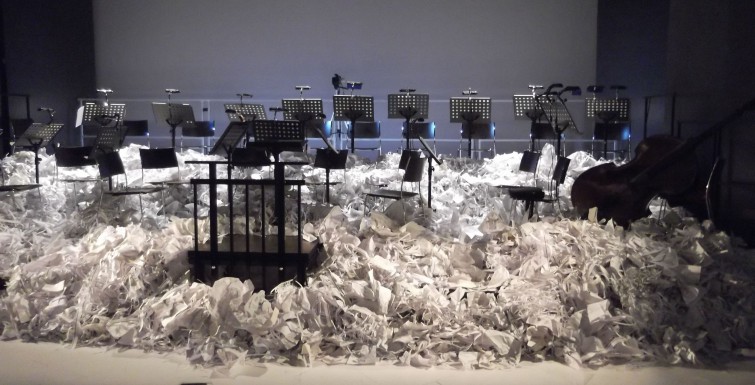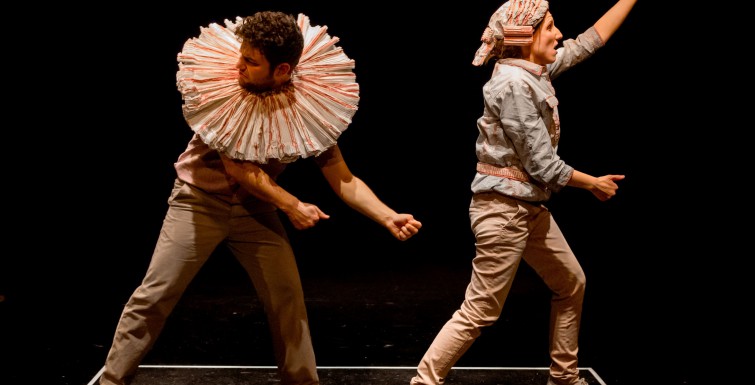Maria Wolgast works as a freelance stage and costume designer and also teaches regularly at various universities, including with us at TU Bühnenbild_Szenischer Raum. From 2008-2010 she studied at the Master program.
Maria, before studying at the Technical University Berlin you studied Art and Drama as well as Scenography in Norway. You worked as a stage designer and assistant at various theaters in Germany (Stadttheater Hildesheim, Parkaue Berlin) and Norway (Nationaltheater Oslo, Oper Kristiansand, Black Box Theater Oslo). What made you decide to complete the Master of Arts at the TU Berlin?
For me it was crucial to develop my own approach especially for music theater and without the production pressure in the theater. At that time I had one wish: to get out of the daily routine of the theater once again. It felt quite tense there, everything went very fast and all that happened between Germany and Norway. I actually wanted to spend a lot of time designing and understanding opera. My theater studies were about acting with a focus on contemporary, interdisciplinary, post-dramatic forms and studying at the Norwegian Academy was great, experimental, very free. But I always felt the need to immerse myself in the complexity of music theater. With this in mind, my focus during the Master was clearly in the field of theater but also the wide range of courses on exhibition design and urban intervention were very inspiring for me. With the Master’s degree I have been able to afford the ‘luxury’ to expand the base for my artistic work – and that certainly shaped me.
When you speak of your artistic approach, how would you characterize your work?
Whether it’s an installation for an exhibition, a musical, a drama, opera, children’s and youth theater or projects in urban space: I am looking for a central image or universe and for a connecting materiality that is as versatile as possible.
I do not think in categories such as built indoor or outdoor spaces, I rather think I am more abstract, but at the same time also more sensual. Anyways, I am always interested in metamorphosis and the process of material and the resulting space – initiated by the actors.
What memories do you associate with the degree program?
Above all, an impressive variety of courses, topics, fields of work including actual realization projects. The intensive supervision by the teachers and above all the lively exchange with the fellow students. We were already quiet an international group, which became even more polyglot in the subsequent study generations I think. What I greatly appreciated are these different cultural and professional backgrounds. I like to remember many valuable conversations and the mutual appreciation of our work in the team and the honest interest in each other and the contents. Many friendships from this period last until today. And last but not least, the studios located in Ackerstrasse, where we worked and actually lived. The Master’s program was a very precious, enriching time for me.
What are your fields of work, with whom and where do you work?
Being a teacher myself was important to me even before my studies at TU, which I continue to pursue next to my work at the theater until today and I am very happy to be able to combine both. Since I am teaching myself at Bühnenbild_Szenischer Raum now, the contact remains and I get to see the changes in the degree program, which I like a lot. Apart from that, I am doing quite well in the fields of theater as well as with teaching. I am regularly lecturing at the Osnabrück University of Applied Sciences, at the Theaterpädagogische Akademie Heidelberg, at the Theaterakademie Mannheim and also give workshops for various educational institutions.
After completing my studies, I have worked a lot as an assistant and in artistic collaboration, for example at the Frankfurt Opera, Stuttgart Opera, Stockholm Opera or Oslo Opera. Then I did my own stage designs at the Junges DT / Deutsches Theater, in the Kulturforum, at the Tischlerei / Deutsche Oper, for the summer opera at Schloss Britz, at theaters in Heidelberg, in Hildesheim, Baden-Baden, Potsdam and Münster. Together with Patrick Bannwart I was in Antwerp and Ghent, in Essen, in Basel (for ‘Elektra’) and at the Burgtheater in Vienna (for ‘Käthchen von Heilbronn’) wich were both directed by David Bösch.
What do you like most about your job?
With all the advantages and disadvantages of freelancing: I can not imagine anything else and always appreciate my independence from institutions. Working together at the theater can be great – working with the directing team, with the workshops and all the people from the house, I love this! It can be very inspiring to see ideas grow. But sure, I would admit without hesitation, that it can also be exhausting and disappointing sometimes. Probably anyone who is working in this field has made this experience at least once…
Is there something that you would do differently today?
I really do not think so.
What advice would you give to someone who wants to go to the theater?
Basically, if there is real interest and commitment, then just get started! Unpaid internships and assistants are the reality at institutional theaters and not just there. Don’t be afraid of that fact, but decide for yourself how much and how long you want to continue with the unpaid internships. It is important to get to know people you want to work with. Which topics, working methods and artistic formats are interesting? Which conditions and projects make it possible to work like you want to work and how and where can they be found or how can they maybe even be self-initiated? That’s quite a lot, but trying out really is the only way to find out.








